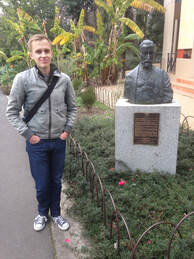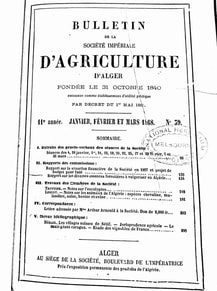|
Jackson Perry The modern history of the ‘discovery’ of Australia typically reads as a tale of the wider world coming to the island continent, in such diverse forms as European colonists and prisoners, rabbits, California redwoods, infectious diseases, and common law. Less emphasized in this tale is the Australian contribution to the history of other parts of the world. For environmental historians and historians of science in particular, there is no better place to understand that contribution than the library of the Royal Botanic Gardens in Melbourne. I visited Melbourne in the winter of 2016 (the southern hemisphere’s winter, that is) seeking primary sources on the spread of eucalyptus to the Mediterranean region in the 19th century. Thanks to the generous support of the Cosmos Club of DC Foundation, I spent two months immersed in the physical and literary world of the German-Australian botanist Ferdinand von Mueller (1825-1896). Mueller immigrated to Australia in 1848, taking the helm of the Melbourne gardens nine years later. Over the next four decades, he engaged in a staggeringly rich correspondence from the edge of the British Empire with the world’s scientific elite, including the Hookers of Kew, Darwin, Agardh, Gray and Liebig, as well as lesser known practitioners of science on every continent. Much of that correspondence was lost after his death; several thousand letters have been reassembled, translated, and made available for researchers in Melbourne. For my purposes, Mueller's interactions with the Mediterranean world included frequent dispatches of eucalyptus seeds to Algeria, France and Italy, and interchanges of scientific information, in both private letters and published journals, with institutions of science. Scholars of North Africa will find complete runs of the Bulletin de la Société d’Agriculture d’Alger (image, right) and the Bulletin Agricole de l’Algérie-Tunisie-Maroc, alongside mycology journals and numerous volumes of Linnaean societies from across the European continent. Other topics with rich potential for further study include the social and bureaucratic histories of pre-Federation Australia, the exploration of Australia, Oceania and the Antarctic, networks of exchange in the Indian Ocean and the British Empire, German colonialism in Africa and Australasia, and Mueller's engagement with the theory of evolution. Further reading:
Jackson Perry is a PhD candidate in history at Georgetown University who studies the transformation of modern Mediterranean environments. His dissertation examines the introduction of the Eucalyptus tree genus to the Mediterranean region in the nineteenth century.
4 Comments
|
EH@G BlogArticles written by students and faculty in environmental history at Georgetown University. Archives
May 2020
Categories |



 RSS Feed
RSS Feed